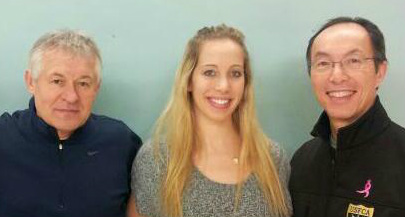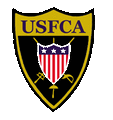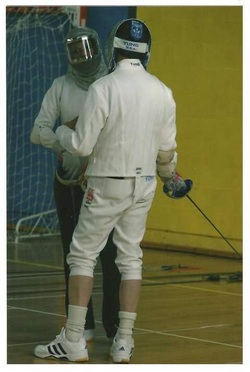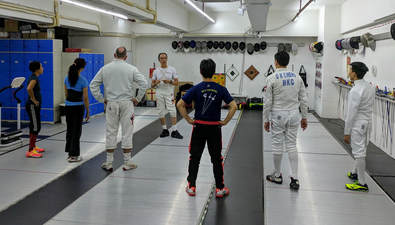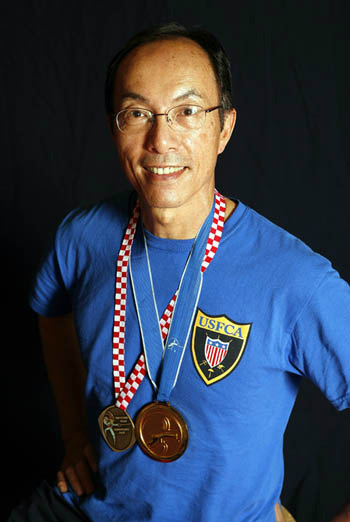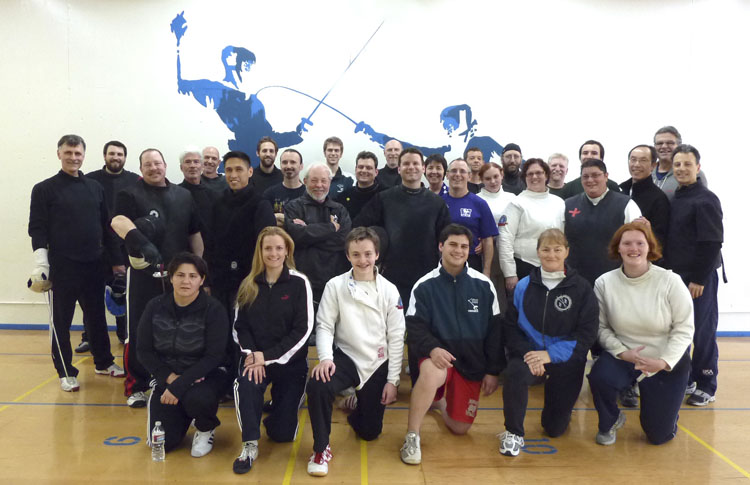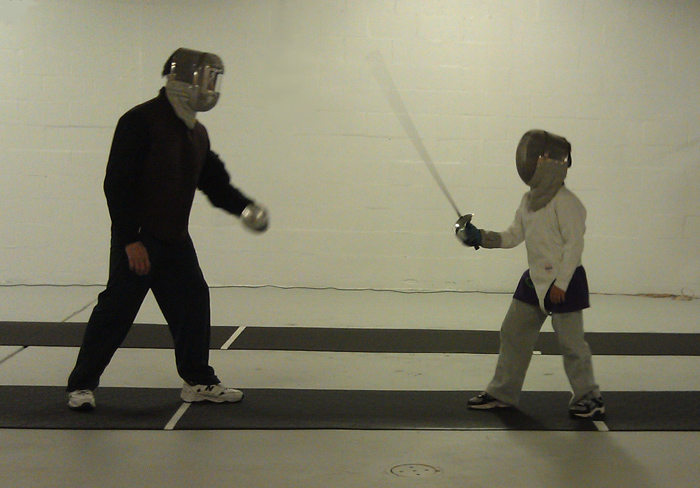2018: One Individual Gold and one team Bronze 2017: One Individual Bronze and one team Gold 2016: One Individual Gold and one team Silver 2015: Two Individual Gold and one team Gold 2014: Two Individual Gold and one team Gold 2013: One Gold & one Silver 2012: Gold Medal 2011: Two Silver medals 2010: One Gold & one Bronze medal 2009: Silver medal 2008: Bronze medal
|
The following is an article in the recent US Fencing Coaches Association newsletter, Point In Line:
MENTORING COACHES; A NEW USFCA PROGRAM
By Joe Jasper, Prévôt de Sabre, and Wang Yung, Maître de Sabre
Most fencers take fencing lessons, but many coaches don't take coaching lessons. A lack of standard exists regarding expectation of coach education. The USFCA board recently approved an official mentoring program. Mentoring is defined as the assigning of a junior coach or mentee to the care of a more experienced coach who assists him in his coaching career. While most instruction can be provided in coaching seminars, a mentoring approach is preferable because the personal knowledge, skills, and needs of one individual may be different from another. The USFCA knows that many coaches would be interested in some kind of mentoring or coaching lessons. Many fencing masters are interested in mentoring newer coaches. Historically, fencing coaches have often been mentored by older and more experienced
Typically, one is first taught to be a fencer, then a coach. Ideally, a competitive fencer does not just retire; rather the fencer decides to become a coach. His or her education may include a formal apprenticeship to an experienced coach or an academic course of study in a dedicated fencing school or university program. This formal method is not universally practical. Common variations in coach development include:
§ Competitive experience that ranges from none to World Cup
§ No formal fencing lessons to many years of lessons under excellent masters
§ Retiring from competition vs. continuing to compete while also coaching
§ Level of coaching education and certification:
* Basing lessons and the organization of his club on what he remembered from his own experiences and observations.
* Learning coaching via self study, reading fencing texts and by observing fencing and by talking to and watching other coaches
* Organized coaching instruction through short, intermittent study such as summer courses or seminars/clinics
* Attending an academy with a formal coach’s curriculum
* Formal physical education degree or coaching experience in another sport.
Multiple factors will influence a coach’s decision in seeking education: time for receiving lessons, affordability, availability and proximity of accredited instruction and commitment. The U.S. is big; many who want to learn do not have access, travel time, or a budget to access more experienced coaches or seminars. One may feel shy or too prideful to ask for coaching lessons. It may be uncomfortable to cold call someone to ask him/her to be your mentor and quiz a potential mentor about his/her qualifications. We have no standard expectation of cost of such a relationship and for some the cost may be prohibitive. The mentoring coach may worry about some of the details of the relationship such as method, curriculum, qualification, time, compensation, teaching someone from a competing club, and liability. These boundaries exist because mentoring has had no guidelines.
The desire for guidance in the development of one’s coaching career varies. In the United Sates there is no typical fencing coach. Some will coach full time; some have a day job and coach part time. Very few coaches in the U.S. have an ongoing mentoring relationship with more experienced coaches. Many are not certified as coaches by the USFCA or any other organization. The USFCA will propose ground rules. The USFCA Mentoring program will have an established list of coaches who want to be mentors. From that mentor list, a mentee can search for mentors who may meet his or her needs.
Mentoring can be oriented to a particular goal. When one wants to accomplish a goal, one needs to know the mentee’s starting point and end point to plan the method. Similarly, the student should choose a mentor most likely to help achieve the goal. For example, the junior coach may be seeking certification as a moniteur, prévôt or maître. The mentor would supervise the training of the junior coach’s development with respect to the level of the certification exam. Steps for this involve the mentor’s role as follows:
Pre-assessment
1. The coaching situational goal of the mentee is assessed. Examples: school semester introduction-level class vs. high-level competitive coaching; single weapon vs. multiple; youth vs. junior vs. adult vs. veteran.
2. Reviews the junior coach’s experience, knowledge base, and skills.
3. The candidate is observed teaching at his current level regardless of experience. This establishes a starting point.
Lesson Planning
The study guides and exam score sheets used by the USFCA certification examiners are reviewed periodically with the candidate. This helps assure that the guidance will be all inclusive of the expectations of the examiners. However, the goal is to create a good coach, not just pass an exam.
A course of action is planned respecting the time allotted.
Educational materials are recommended. Time is allowed for the mentee to read and absorb material with periodic review and practical examples given by the mentor.
Implementation of the plan
The mentor observes the candidate providing each type of lesson. The lesson methods are refined with the goal of satisfying the expected level of coaching. The candidate should be able to teach skills at all levels of the advanced tactical wheel.
Knowledge base for the weapon and rules are reviewed.
High-level competition video is critically reviewed.
Problem-solving Socratic discourse is held.
If the goal is maître, then extensive thesis review and advice will be necessary.
Post-assessment
A mock examination by the mentor of the mentee may be performed.
The mentor should help the candidate determine when the right timing of the exam should be. After all, the examinee’s performance will reflect on the mentor.
Other situations are appropriate for mentoring. Intra-club mentoring and continuing education (CE) is reasonable to assure that methodology is consistent and of high quality. When students see that even the coaches take lessons, the respect for lessons should increase. This can be to impart new skills, review or remedial. It can be a check-up, such as an annual performance review. No one is above review and learning. A coach seeking to learn to teach a new weapon may seek a mentor certified in that weapon. A coach who has a student attaining a high level of competition, such as Div 1, Div 1A, and World Cup, could tap into the experience of a mentor who has been there successfully with his own competitors. In the ever-evolving world of fencing, of weapon specialization and constant changes, it is important to be made aware of changes of tactics and directing. New strategies and techniques can be transferred from a high level competition coach to others through mentoring. Fencing text authors needing guidance may need consultation with mentors, both those who have publishing experience and from other successful coaches. A certified referee may mentor a candidate preparing for refereeing clinics or exams. One may be a mentee under an armorer.
The mentoring program can complement or replace seminars. Attending a seminar oriented to a candidate’s goal assures he will receive instruction in the core curriculum. We recommend attending such seminars. However, seminars do not automate and perfect the skills required for passing the exam. Such skills are acquired through practice, preferably supervised by a certified coach. Further seminars are of limited duration requiring presentation of select aspects of the curriculum. Other coaching skills are often glossed over or omitted. The prévôt seminar may not cover group-class exercises and drills as well as a moniteur seminar. Neither may detail the skills of strip coaching, ethics, business modeling, thesis preparation or acquisition and perfection of new technical skills or strategies. For some junior coaches travel for seminars is impractical, whereas a mentor may be more accessible.
The mentoring program is new to the USFCA. Hopefully we will all make constructive use of the program to the benefit of our USFA coaches and athletes.
Results are what counts. We do not have a way to collect statistics or to conduct a randomized study. Empirically, the new mentoring program has been 100% successful in this ―series of one‖ in that the mentor and mentee achieved their goal. As the mentee, know your goal, know your starting point, choose the right mentor and determine the appropriate process or curriculum.
The two authors developed a mentoring program toward the goal of Jasper seeking his Prévôt de Sabre. This primarily involved practical observation, corrective commentary and demonstration. Additionally, Jasper collaborated with other candidates for didactic review of texts, practicing cues, demonstration of lessons, and in a pre-test seminar. The result was successful. The above example of a mentoring plan evolved from post exam discussions.
Per Maître Yung, “My approach to mentoring Dr. Jasper was respectful of but more generic in purpose and scope compared to his goal to study for the Prévôt examination. My goal was to prepare him to give a lesson to a higher level saber competitor. I never told Joe what he had to do for the exam. I worked with Joe so his lessons would be suitable to a higher level fencer. I presented the situational challenges a Prévôt is expected to weave into the lesson, emphasizing the „how‟ rather than the „what‟ in his lesson. An example of this is presenting proper cues with correct footwork and distance applicable to any lesson. I did not work out a choreographed lesson for the purpose of the exam.” This should realize the real intent of mentoring and coach certification which is to develop lifelong capable coaching skills.
Jasper adds, “A certified coach should do more than teach a student how to perform a skill. He must add why it is best done a particular way. A coach has to explicate not just demonstrate technique. That is, he has to be able to break the skill down into its components, explain the reason for the specific method and be able to place the action in tactical scenarios. The student will then appreciate the purpose behind the action‟s method.”
“To teach, one must first learn,” says Maître Yung.
MENTORING COACHES; A NEW USFCA PROGRAM
By Joe Jasper, Prévôt de Sabre, and Wang Yung, Maître de Sabre
Most fencers take fencing lessons, but many coaches don't take coaching lessons. A lack of standard exists regarding expectation of coach education. The USFCA board recently approved an official mentoring program. Mentoring is defined as the assigning of a junior coach or mentee to the care of a more experienced coach who assists him in his coaching career. While most instruction can be provided in coaching seminars, a mentoring approach is preferable because the personal knowledge, skills, and needs of one individual may be different from another. The USFCA knows that many coaches would be interested in some kind of mentoring or coaching lessons. Many fencing masters are interested in mentoring newer coaches. Historically, fencing coaches have often been mentored by older and more experienced
Typically, one is first taught to be a fencer, then a coach. Ideally, a competitive fencer does not just retire; rather the fencer decides to become a coach. His or her education may include a formal apprenticeship to an experienced coach or an academic course of study in a dedicated fencing school or university program. This formal method is not universally practical. Common variations in coach development include:
§ Competitive experience that ranges from none to World Cup
§ No formal fencing lessons to many years of lessons under excellent masters
§ Retiring from competition vs. continuing to compete while also coaching
§ Level of coaching education and certification:
* Basing lessons and the organization of his club on what he remembered from his own experiences and observations.
* Learning coaching via self study, reading fencing texts and by observing fencing and by talking to and watching other coaches
* Organized coaching instruction through short, intermittent study such as summer courses or seminars/clinics
* Attending an academy with a formal coach’s curriculum
* Formal physical education degree or coaching experience in another sport.
Multiple factors will influence a coach’s decision in seeking education: time for receiving lessons, affordability, availability and proximity of accredited instruction and commitment. The U.S. is big; many who want to learn do not have access, travel time, or a budget to access more experienced coaches or seminars. One may feel shy or too prideful to ask for coaching lessons. It may be uncomfortable to cold call someone to ask him/her to be your mentor and quiz a potential mentor about his/her qualifications. We have no standard expectation of cost of such a relationship and for some the cost may be prohibitive. The mentoring coach may worry about some of the details of the relationship such as method, curriculum, qualification, time, compensation, teaching someone from a competing club, and liability. These boundaries exist because mentoring has had no guidelines.
The desire for guidance in the development of one’s coaching career varies. In the United Sates there is no typical fencing coach. Some will coach full time; some have a day job and coach part time. Very few coaches in the U.S. have an ongoing mentoring relationship with more experienced coaches. Many are not certified as coaches by the USFCA or any other organization. The USFCA will propose ground rules. The USFCA Mentoring program will have an established list of coaches who want to be mentors. From that mentor list, a mentee can search for mentors who may meet his or her needs.
Mentoring can be oriented to a particular goal. When one wants to accomplish a goal, one needs to know the mentee’s starting point and end point to plan the method. Similarly, the student should choose a mentor most likely to help achieve the goal. For example, the junior coach may be seeking certification as a moniteur, prévôt or maître. The mentor would supervise the training of the junior coach’s development with respect to the level of the certification exam. Steps for this involve the mentor’s role as follows:
Pre-assessment
1. The coaching situational goal of the mentee is assessed. Examples: school semester introduction-level class vs. high-level competitive coaching; single weapon vs. multiple; youth vs. junior vs. adult vs. veteran.
2. Reviews the junior coach’s experience, knowledge base, and skills.
3. The candidate is observed teaching at his current level regardless of experience. This establishes a starting point.
Lesson Planning
The study guides and exam score sheets used by the USFCA certification examiners are reviewed periodically with the candidate. This helps assure that the guidance will be all inclusive of the expectations of the examiners. However, the goal is to create a good coach, not just pass an exam.
A course of action is planned respecting the time allotted.
Educational materials are recommended. Time is allowed for the mentee to read and absorb material with periodic review and practical examples given by the mentor.
Implementation of the plan
The mentor observes the candidate providing each type of lesson. The lesson methods are refined with the goal of satisfying the expected level of coaching. The candidate should be able to teach skills at all levels of the advanced tactical wheel.
Knowledge base for the weapon and rules are reviewed.
High-level competition video is critically reviewed.
Problem-solving Socratic discourse is held.
If the goal is maître, then extensive thesis review and advice will be necessary.
Post-assessment
A mock examination by the mentor of the mentee may be performed.
The mentor should help the candidate determine when the right timing of the exam should be. After all, the examinee’s performance will reflect on the mentor.
Other situations are appropriate for mentoring. Intra-club mentoring and continuing education (CE) is reasonable to assure that methodology is consistent and of high quality. When students see that even the coaches take lessons, the respect for lessons should increase. This can be to impart new skills, review or remedial. It can be a check-up, such as an annual performance review. No one is above review and learning. A coach seeking to learn to teach a new weapon may seek a mentor certified in that weapon. A coach who has a student attaining a high level of competition, such as Div 1, Div 1A, and World Cup, could tap into the experience of a mentor who has been there successfully with his own competitors. In the ever-evolving world of fencing, of weapon specialization and constant changes, it is important to be made aware of changes of tactics and directing. New strategies and techniques can be transferred from a high level competition coach to others through mentoring. Fencing text authors needing guidance may need consultation with mentors, both those who have publishing experience and from other successful coaches. A certified referee may mentor a candidate preparing for refereeing clinics or exams. One may be a mentee under an armorer.
The mentoring program can complement or replace seminars. Attending a seminar oriented to a candidate’s goal assures he will receive instruction in the core curriculum. We recommend attending such seminars. However, seminars do not automate and perfect the skills required for passing the exam. Such skills are acquired through practice, preferably supervised by a certified coach. Further seminars are of limited duration requiring presentation of select aspects of the curriculum. Other coaching skills are often glossed over or omitted. The prévôt seminar may not cover group-class exercises and drills as well as a moniteur seminar. Neither may detail the skills of strip coaching, ethics, business modeling, thesis preparation or acquisition and perfection of new technical skills or strategies. For some junior coaches travel for seminars is impractical, whereas a mentor may be more accessible.
The mentoring program is new to the USFCA. Hopefully we will all make constructive use of the program to the benefit of our USFA coaches and athletes.
Results are what counts. We do not have a way to collect statistics or to conduct a randomized study. Empirically, the new mentoring program has been 100% successful in this ―series of one‖ in that the mentor and mentee achieved their goal. As the mentee, know your goal, know your starting point, choose the right mentor and determine the appropriate process or curriculum.
The two authors developed a mentoring program toward the goal of Jasper seeking his Prévôt de Sabre. This primarily involved practical observation, corrective commentary and demonstration. Additionally, Jasper collaborated with other candidates for didactic review of texts, practicing cues, demonstration of lessons, and in a pre-test seminar. The result was successful. The above example of a mentoring plan evolved from post exam discussions.
Per Maître Yung, “My approach to mentoring Dr. Jasper was respectful of but more generic in purpose and scope compared to his goal to study for the Prévôt examination. My goal was to prepare him to give a lesson to a higher level saber competitor. I never told Joe what he had to do for the exam. I worked with Joe so his lessons would be suitable to a higher level fencer. I presented the situational challenges a Prévôt is expected to weave into the lesson, emphasizing the „how‟ rather than the „what‟ in his lesson. An example of this is presenting proper cues with correct footwork and distance applicable to any lesson. I did not work out a choreographed lesson for the purpose of the exam.” This should realize the real intent of mentoring and coach certification which is to develop lifelong capable coaching skills.
Jasper adds, “A certified coach should do more than teach a student how to perform a skill. He must add why it is best done a particular way. A coach has to explicate not just demonstrate technique. That is, he has to be able to break the skill down into its components, explain the reason for the specific method and be able to place the action in tactical scenarios. The student will then appreciate the purpose behind the action‟s method.”
“To teach, one must first learn,” says Maître Yung.
Contact: 425-761-1673 mailto:wyung888@gmail.com
